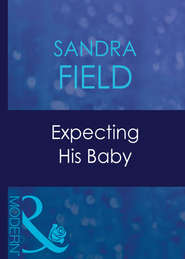По всем вопросам обращайтесь на: info@litportal.ru
(©) 2003-2025.
✖
Wildfire
Автор
Год написания книги
2018
Настройки чтения
Размер шрифта
Высота строк
Поля
As though mocking him, his inner eye presented him with a graphic image of the woman’s sensuous play in the water, of her pleasure-drenched smile and her water-streaked breasts. It was an image that made nonsense of reason in a way that both infuriated and frightened him. Apart from anything else, he had no idea who she was. Perhaps she was a visitor who would be gone from here by the weekend. Perhaps she was happily married. Perhaps he would never see her again. And even if he did, would he recognise her?
Only if she’s naked, the little voice sneered in his ear.
Go away, he growled. This is ridiculous! It makes no difference whether she’s from Vancouver with a husband and ten children or from Halifax with a live-in boyfriend. He, Simon, had not come to Canada to get involved with a woman. He had come to get acquainted with his brother; and to break away from a city that had been stifling him. This unknown woman was nothing to him. Nothing!
Driven by his own thoughts, and despite the headwind that had sprung up, Simon made it back to Jim’s cabin in record time. Physical action, as always, had made him feel better. Grinning ruefully to himself as he felt the twinges in his shoulder muscles, he tied the canoe to the dock. Then he strode up the path to the deck, took the steps in two quick leaps, and pulled open the screen door. It slammed shut behind him with a sound that struck into his memory: just so had another door on another cabin slammed shut half an hour ago.
Determined not to allow that aberrant turmoil of emotion to seize him again, equally determined not to ask a single question about the woman who lived in the cabin on Maynard’s Lake, he said, ‘Mmm...smells good.’
Jim was frying bacon in a cast-iron pan on the gas stove; his cabin, for all its rustic air, had all the modern conveniences. Turning over a rasher with a fork, he said casually, ‘You must have gone quite a way...see anything interesting?’
Jim was all that Simon was not, and in a group of people they would never have been taken for brothers. Ten years younger, four inches shorter, tow-haired where Simon had black hair, Jim had a sunny smile and an open nature, as far from the man of secrets that was his elder brother as a man could be. Jim was like a tabby cat stretched out in a patch of sunlight on the floor, purring in contentment; whereas Simon was like a wildcat, wary, deep-hidden in the shadows of the forest.
‘I went as far as Maynard’s Lake,’ Simon replied. ‘Shall I put some toast on?’
‘Sure...how’s your J-stroke doing?’
Simon grinned. ‘I’ll have you know that I can actually canoe in a straight line, brother dear.’ He cut four slices of the thick molasses bread that was sold at the nearest bakery. ‘I might marry the woman who makes this bread,’ he added.
‘You can’t,’ Jim said amiably. ‘She’s married to the local police chief who also happens to be the county’s champion arm wrestler. Pass me the eggs, would you?’
As Simon took the carton of farm eggs out of the refrigerator and handed them to his brother, he said awkwardly, ‘You’re a good teacher, Jim. Two weeks ago I’d never even been in a canoe. You’ve spent a lot of time with me—thanks.’
Jim shot him a keen glance. But all he said was, ‘You’re welcome. Can’t have you going back to England never having experienced something as quintessentially Canadian as canoeing.’
‘I even saw a beaver this morning. Plus several hundred maple trees.’
‘Then you’re practically a native,’ Jim laughed. Cracking a couple of eggs into the pan, he added, ‘As I recall, the best canoe lesson we had was the one on rescue techniques—that was the morning you turned into a human being.’
After a tiny hesitation Simon said evenly, ‘You believe in direct speech, don’t you?’
‘I say it like it is, yeah...life’s too short for anything else. The first three or four days you were here I figured it was going to be one hell of a long summer.’
Simon remembered the lesson on rescue all too well. It had involved him standing upright in one canoe pulling Jim’s swamped canoe up over the gunwales, and later hauling his brother out of the water, too. Jim had been pretending to be panic-stricken; it had been an interesting few minutes. Certainly it had been the day when the first of the barriers between the two men had fallen to the ground; Jim’s memory was entirely accurate. ‘Do you still feel that way? About the long summer, I mean.’
‘No. Although, like an iceberg, nine-tenths of you stays beneath the surface.’
‘That’s the way I live,’ Simon said, exasperated.
Expertly Jim flipped the eggs over. ‘That the reason it took you the best part of six weeks to answer my letter?’
Simon very carefully buttered the toast, taking his time. He said finally, ‘When I first got here, I mentioned that things hadn’t been going well for me lately. I’m in a rut as far as my painting’s concerned, London feels like a prison—dammit, I don’t even want to talk about it!’
He paused, knowing he had been guilty of understatement. For the last six months he had quite literally found himself unable to paint. In the north light of his studio he had spent hours standing in front of a blank canvas, paralysed by its whiteness, its emptiness, its mute quality of waiting. Since the age of sixteen he had lived to paint. To find himself cut off from his life’s blood had terrified him. And the more terrified he had become, the less able he had been even to hold a brush, let alone use it.
He took a ragged breath, knowing he had to pick up the thread of his story. ‘When your letter came in April, it took me totally by surprise. I’d tried to trace you once, years ago, but the records had been destroyed in a fire, and that was that. There was nothing more I could do. So when I heard from you it was like a voice from the past. I wasn’t even sure I wanted to look at that past. Not in the shape I was in. So I didn’t answer your letter right away, no.’ He added irritably, ‘Those eggs are going to be as hard as rocks.’
Jim drained the fat from the eggs and put them on the plates along with some bacon. ‘When you didn’t answer, I thought you didn’t want anything to do with me.’
‘That’s not true—’
‘After all, who needs a stray brother four thousand miles away?’
‘I never felt that way, Jim,’ Simon said forcefully. ‘I came, didn’t I? I’m here.’ He ran his fingers through his hair. ‘Look, I know I’m not the easiest man in the world to get along with. I spend a lot of time alone—I have to. But I’m glad we’ve met again. Glad we’re getting to know each other. Just give me time, that’s all.’
‘We’ve got all summer. If you want to stay that long.’
Simon put the toast on the table along with a pot of strawberry jam that had also come from the bakery. This was a moment of decision for both him and his brother, he knew, nor did he minimise the importance of that decision. It was not an opportune time for an image of a woman playing naked in a mist-wreathed lake to flicker into his brain. Shoving it back, he said quietly, ‘I’d like to stay, yes. You can always kick me out if you get sick of me.’
‘I’ll do that,’ Jim promised, a smile splitting his pleasant, suntanned face. ‘Let’s eat.’
The eggs were not overdone, and there were huge whole strawberries in the jam. Refilling the coffee-mugs, Simon said, ‘I’ll get fat if I stay all summer.’
Jim shot a derisive glance at his brother’s lean length in the chair. ‘Sure. Anyway, if this dry weather keeps up, there’s a way you can lose weight. If you want to.’
‘What’s that?’ Simon said lazily. ‘Canoe races between here and the bakery.’
‘Fire-fighting.’
About to laugh, Simon saw that Jim was not joking. ‘Where’s the fire?’ he said semi-facetiously.
‘The woods are like tinder right now. We had less snow than normal last winter, and almost no rain all spring. A cigarette dropped in the bracken, a lightning strike—that’s all it would take. I’m on the volunteer fire department here, and we help out the whole county. They’re running a course next week on ground fire-fighting. Want to take it?’
The part of Simon that had felt for months like a lion trapped in a cage said instantly, ‘Yes.’
‘Great. I’ll sign you up.’
‘So you spend your winters teaching junior high school and your summers fighting fires?’ Simon said quizzically. ‘That’s quite a combination.’
‘Fighting fires is a breeze after some of the kids I’ve got. Anyway, I love the woods. If I can save even an acre from burning, that’s worth a lot to me.’
Every window in Jim’s cabin opened into the trees: the drooping boughs of hemlock, the brilliant green of beech, the thin-slivered needles of pine. To think of all these myriad shades of green engulfed in flame and reduced to charred blackness hurt something deep inside Simon. He said with utter conviction, ‘I already love this place.’
‘I was afraid you’d hate it here,’ Jim confessed. ‘I wondered if we should have stayed in my apartment in Halifax all summer—it’s a city, after all, even if it is pretty small beer compared with London.’
‘I came here to get away from cities.’
‘But you haven’t painted anything since you got here.’
Simon’s face closed. Fighting to keep any emotion from his voice, he said, ‘No.’
‘Well, I sure bumped into the glacier there,’ Jim said cheerfully and unrepentantly. ‘I’ve got to go into town this morning and pick up a few supplies...want to come?’
Town was the little village of Somerville, population seven hundred and fifty. ‘Not really. I’ll clean up the dishes, and then I’ll read for a while.’
‘Once I get back, we should go for a swim—it’s going to be another scorcher of a day.’ Jim reached for the shopping list that was taped to the door of the refrigerator.
Would he ever be able to swim again without thinking of a woman’s nude body playing in the water? To his horror Simon heard himself say, ‘I’d thought there wasn’t another cabin further out than this one. But I saw a place on Maynard’s Lake in one of the coves.’











